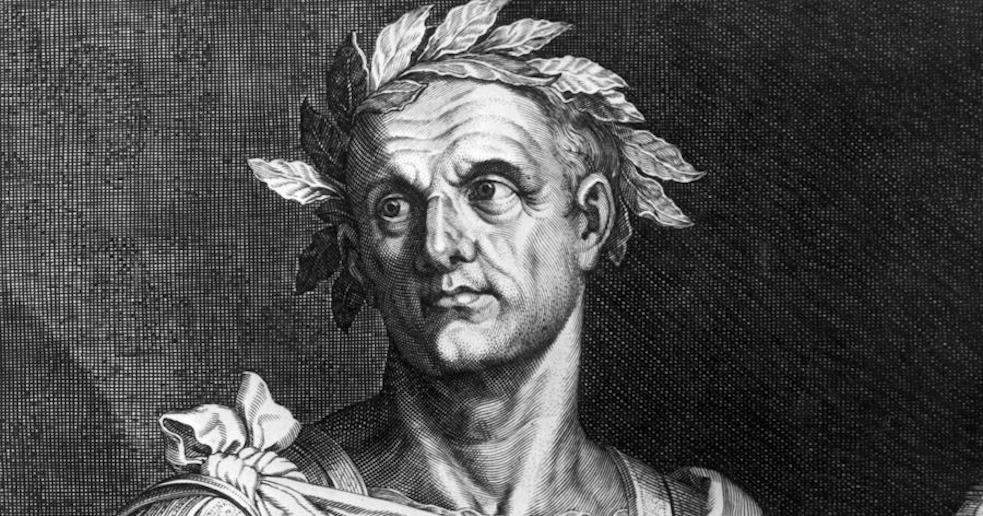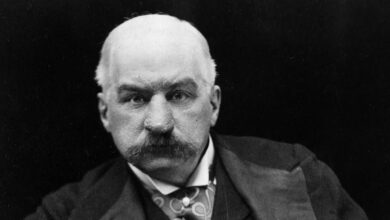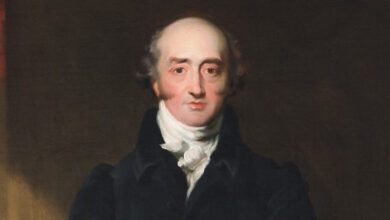
Podcast: Play in new window | Download
Subscribe: Spotify | Amazon Music | Youtube Music | RSS
Julius Caesar Biography
Julius Caesar is sometimes regarded as more myth than man due to his famous, or perhaps rather notorious, place in history as the harbinger of the end of the Roman Republic and the first emperor in the Roman Empire. A brilliant tactician, politically savvy, and intellectually enlightened writer of Latin prose, Julius Caesar was the embodiment of all that was right – and wrong – in the Roman Republic.
Julius Caesar’s family was of little note during the first century. They were minor nobility at best, although the Caesar lineage claims that it harkens back all the way to a Trojan prince who was the son of the Goddess Venus. However, for his family, those high glory days seemed to be long gone. They were not bad off but they were certainly not a family great leadership was expected to hail from.
Julius Caesar himself was born in 100 BC, the son of Gaius Julius Caesar, and little is known of his early days and childhood apart from the death of his father while he was still young. With the death of his father, Julius became the head of the family at the age of 16. During the same period, the family was involved with some political rivalry which had arisen between Julius Caesar’s uncle and another politician, Lucius Sulla. Unfortunately, this rivalry led to a Roman civil war and Caesar’s family found themselves on the losing side, a situation which was effectively the beginning of the end for the Roman Republic. Stripped of title, nobility, and political influence, Julius Caesar went into hiding for his own safety after the end of the civil war.
Due to the intervention of his mother who still wielded some influence with Sulla, Caesar was allowed to return but still concerned for his personal safety, decided to join the army instead. Julius Caesar’s time in the army was met with distinction and he received a number of commendations. After the death of his rival Sulla, Julius felt it was time to return to Rome. He became a popular advocate for the common man fighting against corrupt politicians in Rome and for the next several years, Caesar’s fortunes rose. Between favourable political appointments in Spain, successful military campaigns, and the beginning of a successful political career, Julius Caesar’s star was on the rise.
As his political star rose, so, too, did his ability to gain greater command of the military. With four legions under his command and several provinces bordering his that were unclaimed territory, the time was ripe for Caesar’s famous conquest of Gaul. After years of successful conquests, Gaul was to be one of Caesar’s greatest challenges. The Germanic tribes that resided in the area were more than a match for the Roman military of the era; however, internal squabbles and tribal divisions kept them from uniting into a force strong enough to resist the Roman advance. Gaul, with only a few minor setbacks, was taken for Rome and would remain Roman for the next five hundred years. Caesar attempted to follow up these conquests with an advance into Britain, but due to famine and logistical reasons, Britain was never to be fully conquered by Julius Caesar.
Caesar’s success as a military general as well as his position as a politician began to put him at odds with the leader of the Republic, Pompey. The issue was that his military command was far too strong, and Caesar far too capable, thus he represented a danger to the republic. In an attempt to quell this potential danger, Pompey actually succeeded in causing it. Pompey ordered Caesar to disband his military and come to Rome. Caesar, rightly, fearing that he would be prosecuted or imprisoned by his political rivals were he to enter Rome without an army, refused. Caesar was branded a traitor and insubordinate. In response to this, Caesar did what Roman law forbade and crossed the Rubicon with his army and headed to Rome. The Rubicon was the traditional boundary line upon which legions under command of a general were not allowed to enter.
The crossing of the Rubicon marked the beginning of the next Roman civil war and by some historians is also the date ascribed to the moment when the Roman Republic ended. Julius Caesar chased Pompey out of Rome and across the Roman world, defeating his armies in Spain and Greece before finally chasing him to Egypt where Pompey was betrayed and killed by assassins. After this, Caesar became embroiled in an Egyptian civil war, which after more victories by the brilliant general, was put down for good.
With his victories across Europe and Egypt behind him, and a long political career advocating against corruption and in favour of the common man, Julius Caesar was seen as the saviour of Rome. During this period, Julius Caesar had also witnessed the ineffectiveness of the Roman Republic and decided that the corruption of the Republic could only be solved by having it reformed into an Empire.
Julius Caesar brought about sweeping reforms in his short time as leader of the Roman Republic: designating the 365 day Julian calendar as the standard, minting coins, pardoning enemies, and in 44 BC being appointed dictator for life. Jealous of his power and his influence, Julius Caesar’s political rivals decided to put Julius Caesar out of commission permanently. On the Ides of March (March 15th) of 44 BC, Julius Caesar was stabbed to death by Roman senators. Although his dictatorship had been brief, the Republic was at an end. Julius Caesar’s reforms, as well as the new political system of emperor, would guide Rome for the next 500 years in the west and for another millennium in the east. Julius Caesar in his brief life had changed the world forever.
Podcast: Play in new window | Download
Subscribe: Spotify | Amazon Music | Youtube Music | RSS




